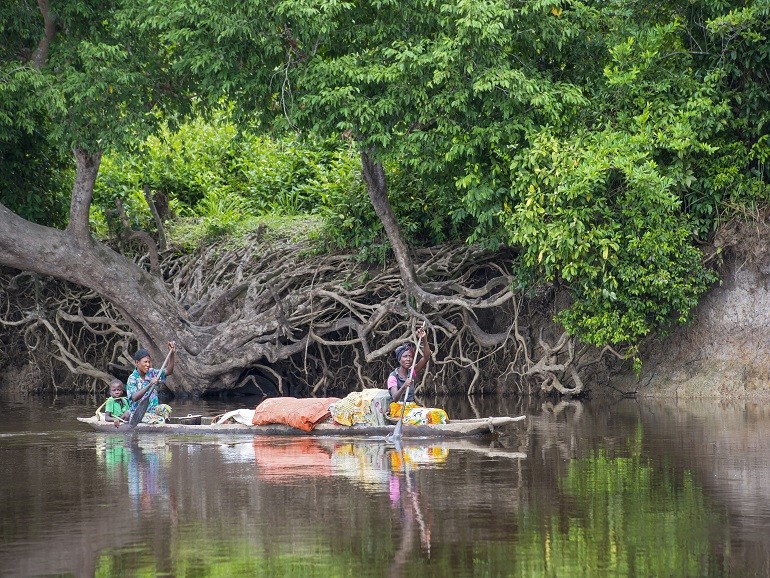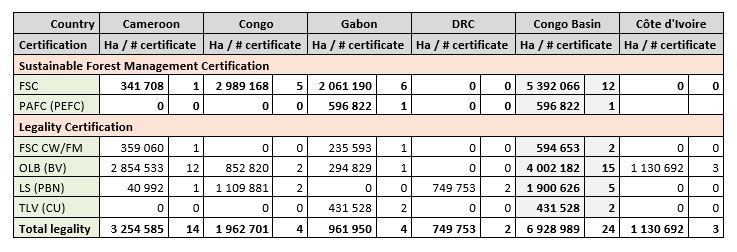

23.07.2021
This meeting was an opportunity to share the latest certification data and to discuss the latest developments, in particular the reflections on the fight against imported deforestation at European level.

On 24th June, the ATIBT Certification Commission held its quarterly meeting to share and exchange views on the certification issues of the last three months.
The latest data and prospects for certification in the Congo Basin were presented. A new certificate of legality was issued in the last six months (BSO in Gabon), bringing the area certified as legal in the region to nearly 7,000,000 ha. Two other certificates of legality are expected by the end of the year.
Consolidated data on certified areas in the Congo Basin are presented in the table below:
 Source ATIBT : June 2021
Source ATIBT : June 2021
Preparation for the FSC General Assembly 2021/2022:
The FSC GA will take place in 2 stages (a virtual meeting in October 2021 and a face-to-face meeting in Bali (Indonesia) in 2022.
A reminder of the follow-up of the ATIBT motions in view of the preparation of the FSC GA, through the IFL sub-group, was made. These motions aim to define IFL management modalities that are compatible with forest management, beneficial to all stakeholders, and which allow the conservation of IFLs.
The FSC launched the Focus Forest project in early 2021 (see article 1 and article 2), which aims to develop tools to define High Conservation Values and management practices. The ATIBT and the certification commission are very much involved in this project, convinced that this initiative will help to find a consensual solution for the consideration of IFL in certified forest concessions.
The ATIBT motions will be revised to integrate the results of this project.
Still on the subject of IFLs, an update was done on the IFL mapping project in Gabon with MINEF and ANPN. This map should become the source of IFL information in Gabon. It is being developed on the basis of the WRI map, integrating historical data, and based on local data.
Following the submission of the PAFC Congo Basin certification scheme in December 2020, the scheme is being evaluated by the consultancy Form International. Results are expected in November 2021.
The project has been extended to include new activities to prepare for the operationalisation of the scheme.
A PAFC webinar was held on 18 June, presenting the advantages of the PAFC Congo Basin certification in sustainable forest management and the specificities of the scheme.
In 2021, it is planned to train regional auditors in October, to train and raise awareness among companies of the system and the requirements of the standard, to develop national interpretation guides, to draw up a guide for assessing carbon stocks and greenhouse gases, and to develop accreditation programmes.
In addition, a request has been made to extend the Congo Basin PAFC scheme to the DRC. The project's objective is to be able to consider the first PAFC Congo Basin certification in 2022, with PEFC recognition the following year.
The Imported Deforestation and the Reflection at EU Level
In view of the challenge of combating climate change, the European Union is currently considering new legislation to ban the import of raw materials that contribute to deforestation. This includes all commodities that could contribute to deforestation, including palm oil, soy, coffee, cocoa, beef and also timber.
In parallel, the EU has undertaken an assessment of the FLEGT regulations (EUTR and FLEGT licensing scheme), called the FLEGT Fitness check.
Available information indicates that the EU draft regulation would move towards a combination of mandatory due diligence (along the lines of what is already implemented under the EUTR) and a voluntary mechanism.
Finally, since 2018, France has been implementing its national strategy to combat imported deforestation (SNDI) through the Comité Scientifique et Technique Forêts (CST Forêt).
The ATIBT's certification commission has taken up the subject by creating a "Imported deforestation" group to analyse the opportunities and risks of these potential guidelines on the tropical timber sector and to ensure that certification is taken into account in these new regulations.
A strategic note has been drawn up and the group is working on defining the ATIBT's position on these subjects.
This reflection is an opportunity for the ATIBT to recall the experience acquired by the Tropical Forestry and Timber sector over several decades to guarantee the legality and sustainability of its activities and wood products while excluding deforestation. Legal and sustainable logging gives additional economic value to the forest, while conserving it and the goods and services it provides and limiting conversion to other land uses.
Payments for Environmental Services (PES):
Following the opportunity studies published by the ATIBT, research is underway to find funding to implement a proof of concept (POC) project of the Vertdeep platform (© Venturexpert), in order to identify the services that could be sold and the modalities to guarantying them, before offering them to potential buyers. The system is based on demand (how much a buyer is willing to pay for a service) and not supply (how much it is worth). A concept note along these lines will be prepared for the attention of PPECF.
For further information, please contact Caroline Duhesme.